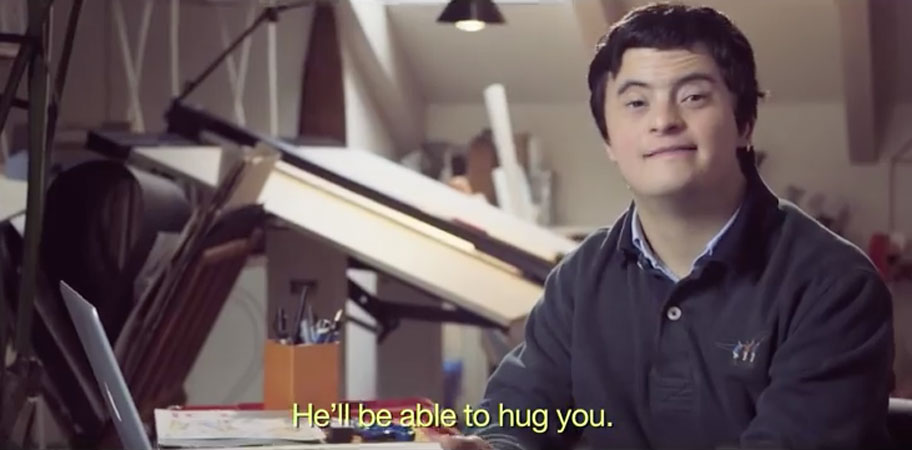For World Down Syndrome Day in 2014, Italian Down syndrome advocacy organization CoorDown released a video titled Dear Future Mom.” The video was created in response to a frightened pregnant woman who had just received a prenatal Down syndrome diagnosis:
“Dear Future Mom” has received international acclaim. It has been seen by millions of viewers around the world, and the theme of the video is “everyone has a right to be happy.” But it seems this message is considered offensive in France — so offensive, in fact, that the video has been banned from airing on French television.
On November 10th, France’s Counseil d’Etat rejected an appeal to lift the ban on the “Dear Future Mom” video. The ban was originally instituted by the Conseil Supérieur de l’Audiovisuel, and was upheld because the video was deemed “inappropriate.” Why? Because the people with Down syndrome in the video, along with their families, were happy and smiling, and this was “likely to disturb the conscience of women who had lawfully made different personal life choices.”
86% of babies diagnosed with Down syndrome prenatally are aborted in France, one of the highest termination rates in the world.
France is the only country to have taken this position on the inspiring “Dear Future Mom” video. And the fight isn’t over; the Lejeune Foundation is taking the case to the European Court for Human Rights, while a Change.org petition launched by the Global Alliance for Disability in Media and Entertainment (GADIM) has already received nearly 2,000 signatures.
“The effect of the decision of the Counseil d’Etat is to discriminate against the capacity for people with Down syndrome to exercise their rights to self-expression and to be factually represented in the media for the individuals that they are and can be,” GADIM writes in the petition. “In particular, it wrongly elevates the mere notion that a person should not be exposed to a troubled conscience over and above realization of the fundamental human rights to non-discrimination, to self-expression and opinion and to full participation by people with Down syndrome on an equal basis with others, as recognized by the United Nations Convention on the Rights of Persons With Disabilities, which was ratified by the French Parliament on 31 December 2009 (the Convention), notably articles 4, 5, 8 and 21.”
In short, this is not only a gross example of discrimination against people with Down syndrome, it is a human rights violation as well as a breach of the convention that the French government agreed to. This ban, in its very essence, lends credence to the idea that the mere public presence of people with Down syndrome, happy and smiling and excited to be alive, could be considered potentially offensive. It’s no wonder that the Down syndrome abortion rate in France is so astronomical, if this is the outlook on people with Down syndrome and other disabilities: that they are an inconvenience, a burden, something to be hidden away lest they bother any of the “normal” people. Even if people want to argue that women should have the right to abort a baby simply because he has Down syndrome, it does not mean that those same women have the right to ban people with Down syndrome from society.
People with Down syndrome are first and foremost people — human beings that have the same rights as everyone else, and should not be hidden away lest they make close-minded people “uncomfortable.” And their happiness at being alive, their love for their families, is not something that should be used against them, either.
This horrifying move sends a disturbing message. Shame on the Counseil d’Etat.







